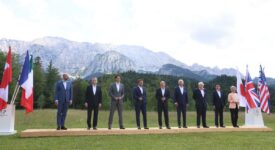The European Union reimposed customs duties on many of Cambodia’s exports on Wednesday (12 August), suspending its trade arrangement over concerns about human rights. Cambodia and the EU have for years been on a collision course over the Southeast Asian country’s “serious and systemic violation of human rights”. Trade commissioner Phil Hogan stressed that while the EU stands by Cambodia in battling the coronavirus, “our continued support does not diminish the urgent need for Cambodia to respect human rights and labour rights.” Hogan also reminded that Brussels has “provided Cambodia with trade opportunities that let the country develop an export-oriented industry and gave jobs to thousands of Cambodians.”
But now, Hogan added, the country has lost its access to the EU’s “Everything But Arms” trade arrangement for least developed countries, which will hit typical exports such as garments, footwear and travel goods. These products represent around 20% of Cambodia’s exports to the EU and will now be subject to the general tariffs applied under World Trade Organisation rules. The trade commissioner said the EU would restore tariff-free access if Brussels sees “substantial improvement” in Cambodia’s human rights record. Cambodia’s textile sector employs 700,000 people. Total trade between the two partners was €5.6 billion last year.
The Commission opened a procedure of withdrawal from the EBA preferences in early 2019 following serious concerns about the steady deterioration of human, political and labour rights in the country, which emerged from decades of war and genocide in the early 1990s. Months later, it submitted a long report detailing systematic human rights violations. A worrying crackdown on political opposition – including a ban on the country’s leading opposition party in 2017 at the government’s request – paved the way to a controversial general election in 2018 that saw a landslide victory for Hun Sen, leader of the ruling Cambodian People’s Party. Due to the absence of any credible opposition, the elections were considered rigged by the international community. Political repression did not end after the elections: during the year-long review conducted by the EU alone, national authorities arrested over 60 members of the opposition and threatened press freedom, according to Human Rights Watch.
Article Categories:
ECONOMY & TRADE






